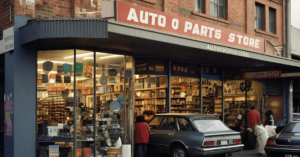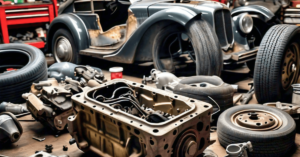In automotive maintenance and repair, buying used car parts has emerged as a cost-effective and practical solution for many vehicle owners. Whether you’re looking to replace a damaged component or upgrade your vehicle without breaking the bank, the market for used car parts offers many options.
Benefits of Buying Used Car Parts
The benefits of opting for used car parts are manifold. To begin with, they are significantly less expensive than purchasing new parts from dealerships. Moreover, used parts can sometimes be the only option for finding rare or discontinued components. From an environmental standpoint, buying used parts helps reduce the demand for new manufacturing, thus lowering the carbon footprint associated with automotive production.
Commonly Purchased Used Car Parts
Some of the most commonly purchased used car parts include engine components such as alternators and starters, transmission parts like gears and clutch assemblies, and exterior components such as body panels and lights. These parts are often readily available on the used market and can significantly extend the lifespan of a vehicle.
Advantages of Buying Used Car Parts
Cost-effectiveness
One of the primary benefits of opting for used car parts is the significant cost savings it offers compared to purchasing new components. Buying pre-owned parts is a cost-effective solution for consumers on a tight budget, as it can sometimes result in obtaining premium things for a lesser price.
Availability of rare parts
In some cases, sourcing new replacement parts can be challenging, particularly with older or discontinued vehicle models. However, the used car parts market provides access to various components, including rare or hard-to-find items, allowing you to maintain or restore your vehicle quickly.
Environmentally friendly
By opting for used car parts, you’re saving money and contributing to environmental sustainability. Reusing existing components helps reduce the demand for new manufacturing, conserves resources, and minimizes waste.
Considerations for Purchasing Used Auto Parts
Compatibility with your vehicle
Before purchasing, you must ensure the used car part is compatible with your vehicle’s make and model. Conduct thorough research or consult with an automotive expert to avoid compatibility issues.
Quality assurance
While used car parts offer cost savings, it’s crucial to prioritize quality to avoid potential performance issues. Look for reputable sellers or sources that provide assurances regarding the condition and functionality of the parts.
Warranty options
Certain sellers may provide warranties or guarantees on secondhand auto components to give customers more peace of mind. Before finalizing your purchase, consider warranty options and understand the terms and conditions.
Where to Find Used Car Parts
Local salvage yards
Salvage yards, or junkyards, are treasure troves for used car parts, offering a wide selection of components salvaged from vehicles. Visiting local salvage yards allows you to inspect parts firsthand and negotiate prices directly with sellers.
Online marketplaces
Online platforms such as eBay, Craigslist, and Facebook Marketplace have become popular destinations for buying and selling used car parts. These platforms offer convenience and accessibility, with many listings to browse from the comfort of your home.
Specialized auto part retailers
Several retailers specialize in selling used or refurbished car parts, providing a curated selection of items tailored to specific makes and models. While these retailers may offer higher prices than individual sellers, they often provide quality assurance and customer support.
Tips for Ensuring Quality
Inspect the part thoroughly.
Examine the used auto part thoroughly before buying it to look for any wear, corrosion, or damage indications. Look for serial numbers or markings to verify compatibility and authenticity.
Check for compatibility
Ensure that the used car part matches your vehicle’s specifications and is compatible with existing components. Double-checking compatibility can prevent costly mistakes and installation issues.
Research the seller
When buying used car parts online or from individual sellers, take the time to research the seller’s reputation and reviews. Opt for established sellers with positive feedback to minimize the risk of encountering fraudulent or misrepresented listings.
How to Purchase Used Car Parts Online
Understanding product listings
When browsing online listings for used car parts, pay close attention to product descriptions, including details about the condition, compatibility, and any included accessories or warranties.
Secure payment methods
If shopping online, choose safe payment options like credit cards or PayPal. To safeguard yourself against fraud or scams, don’t send cash or use insecure payment methods.
Return Policies
Check the seller’s return policy before purchasing to find out what to do if the used car part does not fit your car or live up to your expectations. Ask the seller to address any queries or worries you may have in advance.
Common Mistakes to Avoid
Ignoring compatibility issues
Failing to verify the compatibility of used car parts with your vehicle can lead to installation challenges or functional issues. Always confirm compatibility before purchasing to avoid unnecessary setbacks.
Overlooking warranty details
While warranties are not always available for used car parts, overlooking warranty options can leave you unprotected in case of a defective component. Prioritize sellers that offer warranty coverage whenever possible.
Falling for scams
Be cautious of deals that seem too good to be true or sellers who exhibit suspicious behaviour. When interacting with unfamiliar vendors or listings, follow your gut and proceed with care to prevent becoming a victim of fraud or scams.
Ensuring Safe Transactions
Verifying seller’s reputation
Before purchasing, research the seller’s reputation and history of transactions to gauge their reliability and trustworthiness. Choose sellers with positive feedback and established reputations within the automotive community.
Using secure payment methods
Protect yourself from potential fraud using secure payment methods and avoiding cash transactions whenever possible. Utilize platforms that offer buyer protection and dispute resolution services for added peace of mind.
Reviewing return policies
Familiarize yourself with the seller’s return policy and procedures to understand your options in a dispute or dissatisfaction with the purchased item. Clear communication and documentation can facilitate smooth returns or exchanges.
Tips for Ensuring Quality When Buying Used Car Parts
To ensure that you’re getting reliable parts, there are several steps you can take. Inspecting the parts for any damage or wear is essential before purchasing. Additionally, inquire about any warranty or return policies the seller offers to protect yourself in case of any issues. Finally, research the seller’s reputation to ensure they have a history of providing quality parts and excellent customer service.
Steps to Take After Purchasing Used Car Parts
Following proper installation procedures ensures optimal performance once you’ve purchased your used car parts. Additionally, regular maintenance is crucial to prolonging the lifespan of the parts and preventing premature failure. Providing feedback and reviews for the seller can also help others make informed decisions when purchasing used parts in the future.
Frequently Asked Questions (FAQs)
Yes, used car parts can be as reliable as new ones if sourced from reputable sellers and adequately inspected.
The amount saved varies depending on the part and its condition, but saving up to 50% or more is not uncommon compared to buying new.
Many sellers offer return policies, but clarifying this before purchasing is essential.
While there are risks, such as receiving faulty parts, conducting thorough research and buying from trusted sources can mitigate these risks.
Recycling old car parts is a responsible option. Many salvage yards and recycling centers accept used automotive components.
Conclusion
In conclusion, compared to buying new parts, buying used auto parts is more affordable and environmentally beneficial. Consumers may make informed selections and take advantage of the numerous advantages of used vehicle parts by considering compatibility, quality, and the source’s reliability.







